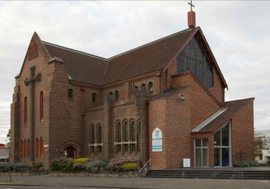Confirmation
In the Service of Confirmation, an individual confirms the promises made (often on their behalf when they were an infant) at their Baptism. While Confirmation is not strictly speaking a sacrament, it is still required to become a full member of the Anglican Church.
Confirmation is a rite of passage that enables us to make clear our intentions to continue growing in the faith and practice of the church.
God’s grace continues to work after a person has been baptised and through this divine life within us, we mature and grow as Christians. In a sense, Confirmation confirms and strengthens Baptism.
Individuals may be sponsored for Confirmation by a member of the Parish of the Parks, although this is not mandatory. Preparation for Confirmation usually involves conversations and reflection opportunities with the Vicar, together with other members of the congregation. It is then carried out by the Bishop within the context of a Eucharist Service.
During Confirmation, the Bishop extends their hands over all the candidates while they say the prayer for the sevenfold gifts of the Spirit. The individual may be anointed with oil marking a sign of the cross on the forehead.
The biblical model for this is Christ’s own Baptism in which, the gospels tell us, the Spirit descended on Him when He came up out of the water after having been baptised by John the Baptist (Matthew 3: 16-17, Mark 1: 9-11, Luke 3: 21-22, John 1: 32-33). The meaning of confirmation - Church of England.
Confirmation is a rite of passage that enables us to make clear our intentions to continue growing in the faith and practice of the church.
God’s grace continues to work after a person has been baptised and through this divine life within us, we mature and grow as Christians. In a sense, Confirmation confirms and strengthens Baptism.
Individuals may be sponsored for Confirmation by a member of the Parish of the Parks, although this is not mandatory. Preparation for Confirmation usually involves conversations and reflection opportunities with the Vicar, together with other members of the congregation. It is then carried out by the Bishop within the context of a Eucharist Service.
During Confirmation, the Bishop extends their hands over all the candidates while they say the prayer for the sevenfold gifts of the Spirit. The individual may be anointed with oil marking a sign of the cross on the forehead.
The biblical model for this is Christ’s own Baptism in which, the gospels tell us, the Spirit descended on Him when He came up out of the water after having been baptised by John the Baptist (Matthew 3: 16-17, Mark 1: 9-11, Luke 3: 21-22, John 1: 32-33). The meaning of confirmation - Church of England.

